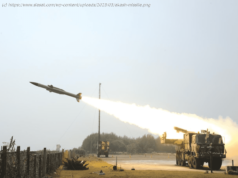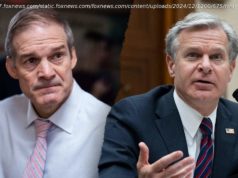WASHINGTON – U. S. Ambassador Nikki Haley said Wednesday that North Korea’s launch of an intercontinental ballistic missile that some observers believe could reach Washington and the entire U. S. Eastern Seaboard “brings us closer” to a war the U. S. doesn’t seek. Haley, speaking at an emergency meeting of the United Nations Security Council, said that if war comes as a result of further acts of “aggression” like
WASHINGTON – U. S. Ambassador Nikki Haley said Wednesday that North Korea’s launch of an intercontinental ballistic missile that some observers believe could reach Washington and the entire U. S. Eastern Seaboard “brings us closer” to a war the U. S. doesn’t seek.
Haley, speaking at an emergency meeting of the United Nations Security Council, said that if war comes as a result of further acts of “aggression” like Tuesday’s launch, “make no mistake the North Korean regime will be utterly destroyed.”
“The dictator of North Korea made a decision yesterday that brings us closer to war, not farther from it,” Haley said. “We have never sought war with North Korea and still today we do not seek it.”
The Trump administration threatened new sanctions on North Korea after the reclusive government shattered 2½ months of relative quiet with its most powerful weapon test yet.
President Donald Trump tweeted that he spoke with Chinese President Xi Jinping about Pyongyang’s “provocative actions,” and he vowed that “additional major sanctions will be imposed on North Korea today. This situation will be handled!” Trump’s top diplomat, Rex Tillerson, said the U. S. could target financial institutions doing business with the North.
At the emergency Security Council meeting, China’s deputy U. N. ambassador Wu Haitao reiterated the China-Russia proposal for North Korea to suspend all nuclear and missile tests and for the U. S. and South Korea to suspend all military exercises.
The deliberations about new forms of punishment for North Korea came after its government said it successfully fired a “significantly more” powerful, nuclear-capable ICBM it called the Hwasong-15. Outside governments and analysts concurred the North had made a jump in missile capability.
A resumption of Pyongyang’s torrid testing pace in pursuit of a viable arsenal of nuclear-tipped missiles that can hit the U. S. mainland had been widely expected. But the power of the missile and suddenness of the test jolted the Korean Peninsula and Washington. The launch at 3:17 a.m. Wednesday local time – early Tuesday afternoon in the U. S. capital – indicated an effort to perfect the element of surprise and obtain maximum attention in the U. S.
In a government statement released through state media, North Korea said the Hwasong-15, the “greatest ICBM,” could be armed with a “super-large heavy nuclear warhead” and is capable of striking the “whole mainland” of the U. S. The North said the missile reached a height of 2,780 miles and traveled 590 miles before accurately hitting a sea target, similar to the flight data announced by South Korea’s military.
After the launch, it said leader Kim Jong Un “declared with pride” that his country has achieved its goal of becoming a “rocket power.” State TV said Kim gave the order Tuesday, and it broadcast a photo of Kim’s signed order where he wrote: “Test launch is approved. Taking place at the daybreak of Nov. 29! Fire with courage for the party and country!”
Speaking later Wednesday, Trump could not resist taking a dig at Kim. Digressing during a speech in Missouri on tax reform, Trump called Kim “Little Rocket Man” and described him as “a sick puppy.”






